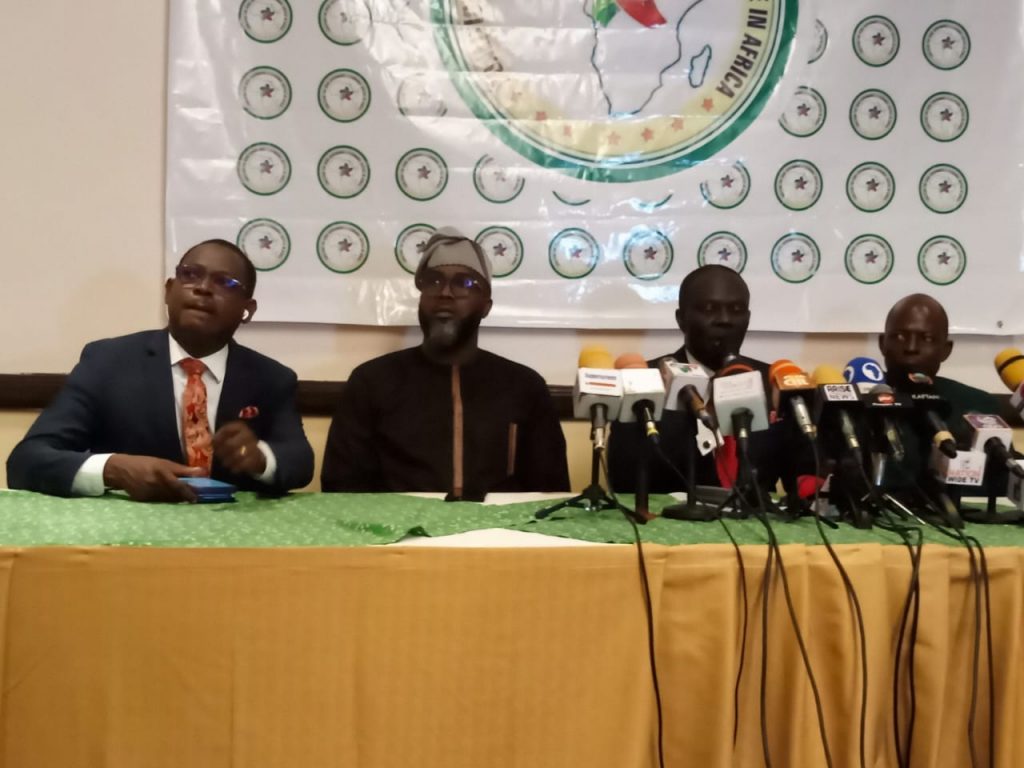…as Mayaki advocates for region’s headship of Senate for inclusive govt
Ben Peters, Abuja
Convener of the South-South for Senate Presidency, Prince Kassim Afegbua, on Monday said it will amount to injustice to accord privilege to the South-East over the South-South for the Presidency of the 10th Senate.
Afegbua who briefed journalists in Abuja, said such action would amount to the party giving one of its biggest prizes to a geopolitical zone that contributed the least to its victory.
The former Commissioner and a staunch supporter of the All Progressives Congress presidential candidate and Nigeria’s President-Elect, Asiwaju Bola Tinubu, stressed that the import of this to members of the APC in the future would be that a sense of entitlement and heavy investments in emotional appeal is all a region needs to score big in the post-election scramble for power, not the results at the polls. This, he argued, would be damaging to any party with future plans to maintain its hold on power.
Afegbua said, “It is clear that going by Nigeria’s history, its constitutional and moral obligation to ensure social justice and equitable representation of the sociocultural groups and geo-political zones that make up the country, as well as recent political perks and privileges enjoyed by each region; the most deserving region for the Senate Presidency is the South-South geo-political zone. To open his administration on a positive and optimistic note, the President-Elect must lead the party in this direction.
“We have assembled you here today to affirm our commitment to the principles and ideals that undergird the foundation and survival of Nigeria as a single nation of diverse groups and cultures.
“The principle of equitable representation and social justice must at all times be consciously and deliberately sustained to promote the doctrine of politics of inclusion.
“They were the basic guarantees assured to the multi-lingual and multi-religious ethnicities that came together to form West Africa’s variant of a rainbow nation in 1960, the year Nigeria won her independence from the British colonialists.
“Indeed, Nigeria’s unique composition of diverse cultural groups, each with its own distinct history and bitter episodes of colourful clashes, was made possible because every member was promised fair consideration and equal prioritization of their aspirations and concerns. This alongside the fact that the leadership of the country will always reflect its make-up, with each constituent region and the ethnocultural group offered a befitting seat at the proverbial table of power.
“The Constitution gives voice and legal force to the spirit and ideal of politics of inclusion by enshrining the Federal character principle. It was both a response to Nigeria’s peculiarities and a sign of the country’s acceptance of the defining quality of democracy which protects the minority from the tyranny and arbitrary desires of the majority.
“At this time, more than at any other time in our nation’s history, we believe that she must honour this ideal to preserve her unity and ensure stability. The last elections raised the temperature of the country, with ethnicity and religion becoming worrying sources of strife and bitter disagreements. While this is truly not an unusual development in the life of the nation, it is without a doubt that the norm-shattering Muslim-Muslim ticket of the victorious ruling party raised the stakes and triggered the historically-informed insecurities of several groups about hegemony and outright domination.
“It is, therefore, incumbent upon the next administration to take deliberate steps to assuage the fears of many and re-affirm its own commitment to fairness, social justice, and equitable distribution of power amongst the geopolitical zones. The President-Elect has justified his selection of a Muslim running mate as a practical choice informed by election victory calculations, not religious bigotry. He must now back the assurance with actions, beginning with the composition of the leadership of the National Assembly, specifically the Senate Presidency and Speakership which are the reasons for this press engagement.
“The Senate President, being the third highest-ranking government official in the country, and one produced by an indirect election largely influenced and determined by the ruling party, is and has always been an opportunity to balance ethnic, regional, and religious concerns. The need for balancing that algorithms, is more compelling now, in view of our present history and shared commitment.
“It is the biggest indicator of every President and party’s sensitivity to national feelings, grievances, and inclinations. It sets the stage for how the administration would be perceived and projects the president’s own leadership style and moral strength, including his ability to organize, lead, and nudge the party in the direction of justice and other larger goals away from narrow, parochial interests. That is how important a decision it is.
“In this dispensation, under the prevailing circumstances, we strongly believe that the incoming president Asiwaju Bola Ahmed Tinubu and the APC can only satisfy the necessary need to balance ethnic, regional, and religious concerns by ceding the Senate Presidency and Speakership to other religions. In the light of this, we appeal to the leadership of the ruling party, the APC, and the President-elect to cede the Senate President to the South-South geopolitical zone.
“The argument as to why it must be a member credibly subscribed to other faith is self-evident and requires no elaborate explanation or defence. With the incoming President and Vice President both Muslims in a country with compelling argument for balancing of all the factors and forces, it will only be reasonable and rational to allow other religions occupy the Senate President and Speakership positions. The interest of this group is for the Senate President to be zoned to the South-South. The South-South geopolitical zone occupies a very formidable and remarkable consideration as the treasure base of the country that ought to be accorded special recognition to compensate for all her sacrifices thus far. The economic importance of the zone and its strategic relevance to stabilising the politics of the nation, cannot be over-emphasised. In the last election, the ruling party, the APC, was able to make serious in-roads into the zone that has been under the threshold of the opposition PDP. Aside from winning Rivers State, the APC came second in the other five states, thus simplifying the requirement needed by the Presidential candidate to defeat his opponents.
“While many fair-minded actors agree in principle that the Senate Presidency must return to the South given the fact that the incumbent is from the North, similar to the Vice President-elect; and with the South-West out of the contest, given that it is the home of the President-Elect, there are those who have made a case for the South-East based on the region’s perpetual cry of marginalization and the need to balance the power equation. But what the South-East desires is the presidency of the country, anything short of that, is a slap on their face, moreso that the zone had occupied the seat of Senate President on five occasions, for eight years, and deputy senate president position for 12 years, in the last 24 years of our fledgling democracy. In the minds of those who make the argument, to pacify the South, is to indulge the South East and to heed its call for a sense of belonging.
“Let me re-emphasise that in the last 24 years, the South East has enjoyed the unique privilege of producing the Senate President on five different occasions. Senators Enwerem, Okadigbo, Wabara, Anyim, and Nnamani, all of whom held sway as the Presidents of the Senate in the present fourth republic are all from the South East. If you include the additional stretch of 12 years during which the South East also held the Deputy Senate President position, that amounts to a near total control of that arm of government, and a more than earned political compensation.
“Moreover, considering that the contributions of each region to the victory of the ruling party is also a significant factor in the power-sharing tussle, as there would be no power to share without electoral triumph; it is just as important to scrutinize the numbers the South East gave to the APC in the presidential election.
“Indeed, whilst Senators from the region who are angling for the Senate President position manage to secure convincing victory in their various senatorial districts, with some of them pulling thousands of votes, the President-Elect was only able to claim a negligible figure, even though both contest, (the Senatorial and Presidential) held on the same day and followed the same process. This points to a possible conspiracy in which the Senators from the Eastern extraction happily traded away the President-Elect’s chances to secure their own victories. If this is the case, as the evidence suggests, it exposes a sore lack of belief in the President-Elect and a most damaging act of self-preservation.
“Contrary to this, the South South region stood firm and contributed a significant percentage of votes to the President-Elect’s victory. The APC came first in Rivers State and claimed over 45% of the total number of votes in the other five states. This is despite the historic status of the region as an opposition stronghold. The members of the party from the South South displayed a high sense of duty and loyalty to the party, canvassing votes not just for their individual positions but equally for the President-Elect. Indeed, without their outstanding show of belief, the President-Elect may have well faltered in achieving the mandatory 25% spread in the two-thirds of states of the Federation.”
On his part, Prince John Mayaki,
Country Director, Coalition for Good Governance and Economic Justice in Africa, said the Coalition “had been consistent in its demand for a Nigeria, and indeed Africa, led by the most capable hands and the brightest minds who are driven by a high sense of purpose and growth-based agenda. Competence, obviously, is central to achieving this. But we equally recognize that it is one element of the matrix. National stability, wrought by social justice and inclusion, is also key. Hence, government composition, in line with Nigeria’s federal constitution, must acknowledge and put into account the country’s diversity in such a way that all segments of the Nigerian society, especially the often overlooked ‘minorities’, derive a sense of fair representation.
“With the emergence of a same-faith presidential pairing of male members of the South West and North Eastern parts of the country, we believe, like so many Nigerians, that the accompanying political process leading to the (s)election of other important national officeholders must pay serious attention to such needs as ethnic, region, religious, and gender balancing. As such, in the specific case of the Senate President, the third highest ranking government official in the country, the ruling party with a controlling majority in the parliament, must manage the selection process to deliberately cater to the aforementioned goal of social justice.
“The history of political power distribution in Nigeria and present dynamics justify the ceding of the Senate Presidency to a Christian from the South South geo-political zone of the country. It is perhaps the most effective way to ensure a satisfactory inclusion of the hugely important region in the leadership of the country; a development certain to calm agitations in the region and help the country avoid possible uprisings that may threaten its fragile economy, especially as it is about to veer into uncharted waters with the planned removal of the oil subsidy.
“Our stand is based on Nigeria’s history and the need for inclusive leadership as a precursor to peace and stability in a country as diverse and polarized as Nigeria.”



































































